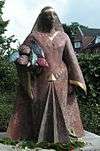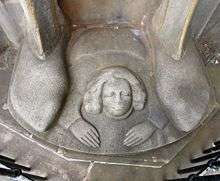Emma of Lesum
Emma of Lesum or Emma of Stiepel (also known as Hemma and Imma) (ca. 975-980 – 3 December 1038) was a countess popularly venerated as a saint for her good works; she is also the first female inhabitant of Bremen to be known by name.
Saint Emma of Lesum | |
|---|---|
 Statue of Saint Emma of Lesum | |
| Born | 10th century Duchy of Saxony |
| Died | 3 December 1038 Lesum, now Bremen-Burglesum |
| Venerated in | Roman Catholicism |
| Major shrine | Werden Abbey; Bremen Cathedral |
| Feast | 19 April or 3 December |
Life
Emma was born into the Saxon noble family of the Immedinger, descendants of Widukind. She was the daughter of Count Immed (or Imad) from the diocese of Utrecht and also, according to Adam of Bremen, the sister of Meinwerk, Bishop of Paderborn. She married Liudger, a son of the Saxon duke Hermann Billung and brother of Bernard I, Duke of Saxony. Emperor Otto III made the couple a present in 1001 of the Pfalz or palatium in Stiepel (now Bochum-Stiepel), where in 1008 Emma had a church built dedicated to the Virgin Mary, which later became a popular place of pilgrimage. The only child of the marriage was Imad, consecrated Bishop of Paderborn in 1051.
After the early death of her husband by going to Russia and getting a rare sickness.[1] in 1011, Emma withdrew to the estate of Lesum (now Bremen-Burglesum) and with her fortune generously supported Bremen Cathedral, where Unwan, Archbishop of Bremen, was another of her relatives, and granted the cathedral chapter her property at Stiepel with its church. She was portrayed as a great benefactress of the church, and indeed founded a number of churches in the Bremen area, although her greatest care was for the poor.
Emma was later venerated as a saint, although there is no evidence that she was formally ever either beatified or canonised. She was buried in Bremen Cathedral, where her tomb was still to be seen in the 16th century. Her tomb is one of the biggest in the cemetery.
There is a stained glass window of her in the Roman Catholic church of St. John's at Schnoor in Bremen.
Her feast day is 3 December or 17 April, although some sources name 19 April instead. When the tomb was opened, her body had crumbled to dust except for her right hand (the hand that dispensed gifts). That relic was placed in the abbey of Saint Ludger at Werden.
Legend of the meadow

There is a well-known Bremen legend concerning her gift of meadow to the town in 1032. When a delegation of the townspeople approached her with a request for more meadowland, Emma promised them as much meadow as a man could run round in an hour. Her brother-in-law Bernard or Benno, duke of Saxony, with an appraising eye on his inheritance, suggested mockingly that she might as well give them as much land as a man could run round in a day. Emma agreed to this, but Bernard asked to choose the man who was to do the running, and when Emma agreed to that too, picked out a legless cripple past whom they had just walked. This man proved however to have extraordinary strength and endurance and by the end of the day had succeeded in making his way round a very substantial area, bigger even than the present Bremen town meadow.
This story has been current in various forms since at least the 18th century, although there is no documentary evidence for it, and gives a whole new possible meaning to the inclusion of the figure of the "cripple" at the feet of the statue of Bremen Roland.
Naming
In Bremen the "Emmasee" (Lake Emma) and a café in the main park are named after Emma, besides streets in the districts of Bremen-Burglesum and Bremen-Schwachhausen.
In Bochum-Stiepel there is a Gräfin-Imma-Strasse (Countess Emma Street), a Countess Emma church (Gräfin-Imma-Kirche), as well as a primary school (Gräfin-Imma-Grundschule) and a kindergarten (Gräfin-Imma-Kindergarten), named after her.
- This article is largely translated from that on the German Wikipedia
See also
- List of Catholic saints
- Saint Emma of Lesum, patron saint archive
Notes
- It is sometimes stated that until the death of her husband she had a very sudden and violent temper that occasionally led her to commit physical violence
Sources
- Schwarzwälder, Herbert, 2003: Das Große Bremen-Lexikon. Edition Temmen. ISBN 3-86108-693-X
External links
- Ekkart Sauser (1999). "Emma of Lesum". In Bautz, Traugott (ed.). Biographisch-Bibliographisches Kirchenlexikon (BBKL) (in German). 16. Herzberg: Bautz. cols. 453–454. ISBN 3-88309-079-4.
- (in German) Heiligenlexikon
- (in German) Kirchensite.de
- (in German) Bremen Town Park